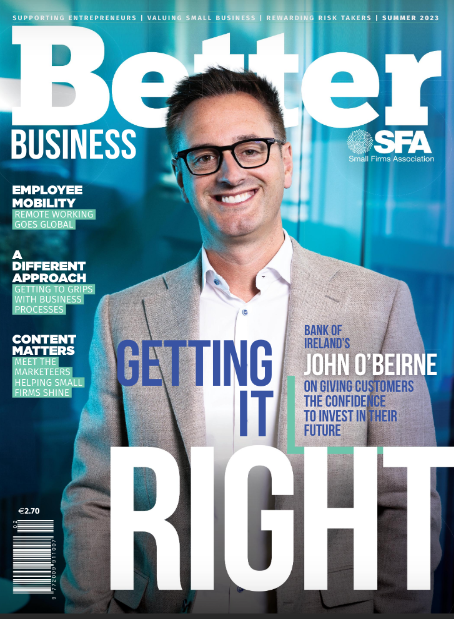In the late noughties, a collective term for design performance started to become mainstream – the term was ‘UX’, a collection of design performance-related skills and disciplines. Today, at a time when consumers embrace or abandon a brand depending on the quality of the digital experience, the importance of an effective user experience, or UX, strategy has never been more critical.
Fathom founder and CEO Gareth Dunlop has always cut his cloth within the digital sphere. “I graduated in the mid-1990s just as the web was in its infancy,” he says. “I experienced the highs and lows of the dot com boom and bust while running Northern Ireland’s largest web agency at the time, Tibus, from 2002 to 2009.”
Following the sale of Tibus, Dunlop began to examine why some organisations enjoyed great success online, while others struggled to get off the ground. These examinations resulted in the digital entrepreneur developing a real interest in design performance, and time and time again he came back to one simple truth: organisations that knew its customers best, valued customer insights and understood customer motivations, achieved the best results.
In September 2011, Dunlop plucked up to the courage to set up Fathom, a dedicated UX agency based in Belfast. Almost eight years later, a team of 12 manage the UX needs of some of the most recognisable, as well as emerging, brands across Ireland and the UK. The county Antrim native has also been involved with a host of other digital startups – some of which have been successful, others less so.
“If you look at my LinkedIn profile, my career has moved from glorious success to glorious success, but that’s just because I haven’t posted the crushing failures.”
Awareness around UX is undoubtedly growing. The world’s leading digital brands, without exception, fully understand how important it is to put the user at the centre of all design processes.
“There is a realisation that user expectation is increasingly being set not by competitors in a specific sector, but by WhatsApp, Google and Amazon,” explains Dunlop. “In short, customers are expecting that the companies with whom they do business with digitally will treat them as well as they are treated by WhatsApp, Google and Amazon. Across all sectors, we find that the digital winner is the organisation that treats its customers better than the rest of its competitors.”
Seeing the world from the perspective of the customer is Fathom’s lifeblood.
“Our offering to clients is to work alongside them to design digital products that ensure that the customer’s voice is front and centre of the decision-making process,” informs Dunlop. “I am regularly pleasantly surprised by how confidently and accurately we can make design decisions when we know what users need and want.”
Dunlop believes that, for decades, the buyer-seller balance of power has been heavily weighted in favour of the seller due to the fact it was easy for companies with deep enough pockets to muscle their way to positive public perception. However, the internet has swung the power balance in favour of the customer.
“After decades of being lied to, customers are mad as hell and are loving their new-found power, which is based on easy access to knowledge,” he enthuses. “Two things intrigue me greatly about technical developments. Firstly, users frequently use technology in different ways to how it was designed. And, secondly, they regularly use technology in a more selfish way that technologists predict.”
Dunlop continues: “As location services matured about a decade ago, the digital industry predicted that this would mean hyper-local location-based notification marketing, alerting users as they walked down the street that they could enjoy a discount in a nearby store. As it turns out, the biggest impact of technology in a retail environment is showrooming – checking out a product in store, and using 4G or in-store Wi-Fi to check the price online, and then buying the product online if the price difference is great enough. In other words, marketers thought the technology would give power to the retailer, but it ended up giving power to the customer.”
The digital journey
The Fathom CEO believes the most common mistake companies make in terms of UX design is failing to grasp that the first job of a designer is to solve problems for users.
“Usability and a user’s needs can become window-dressing, bolted on at the start or end of a project,” describes Dunlop. “To design for someone, you need to know their motivations, expectations, vocabulary, concerns and behaviours. UX design doesn’t come as standard with web design. Good web designers can design the product correctly, but they cannot design the right product without significant user input and feedback. UX needs to be fully baked into the design and development process from the offset.
“Treating customers, as well as prospective customers, in the correct manner through digital platforms is
imperative for all organisations. And you don’t need Facebook or Google-sized budgets in order to get a return on investment. Give your customers confidence and motivation, answer their questions and encourage more of them to buy from you.”
Having a seamless digital journey is now essential for firms, small and large, to deliver maximum effectiveness. There is a significant amount of insight to be gained by using analytical tools, running surveys and speaking to your front-line staff. By taking time to find that customer knowledge, you can build websites, apps and software which users will enjoy and, in turn, become loyal to your brand.
Looking to the future, Dunlop and Fathom’s goal is to be the best human experience design agency on the island of Ireland by continuing to expand the company’s expertise in service design and innovation thinking.
“We’ll keep on investing in our people to become a even more desirable place for staff to engage with challenging and high-profile UX projects,” says Dunlop. “It is a very exciting time to be part of the user experience design industry and Fathom has a hunger and an ambition to continue to lead it in Ireland, as well as further afield.”
[simple-author-box]



